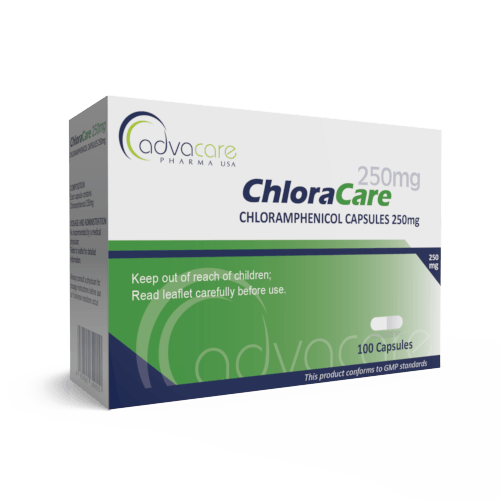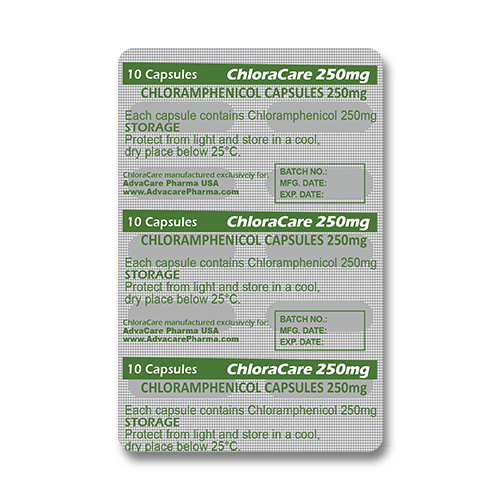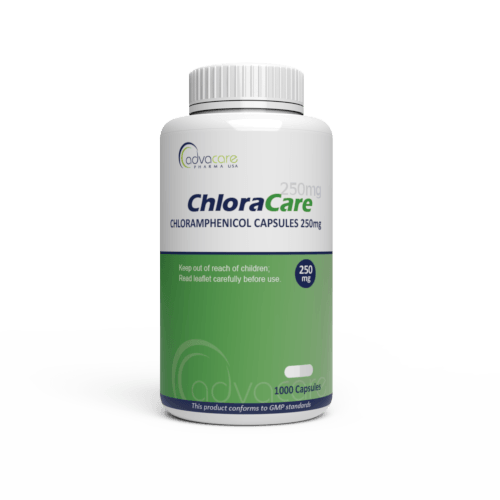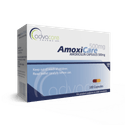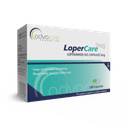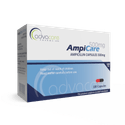- Home›
- Pharmaceuticals›
- Capsules›
- Chloramphenicol Capsules
Chloramphenicol Capsules
Dosage
Packaging
What is Chloramphenicol?
Active Ingredients: Chloramphenicol
Chloramphenicol Capsules are a drug used to treat severe bacterial infections that are resistant to other antibiotics. This drug is used, either alone or in combination with other antibiotics, for the treatment of some types of bacterial infections, such as conjunctivitis, meningitis, cholera, and typhoid fever.
Due to the severe risk of aplastic anemia, Chloramphenicol is typically used after other antibiotics have shown ineffective or safer antibiotics are unavailable.
Chloramphenicol is a broad-spectrum semisynthetic antibiotic that was originally derived from Streptomyces venezuelae. The active ingredient works by inhibiting protein synthesis in the bacteria. It is active against many types of bacteria, such as Haemophilus Influenza, Neisseria meningitidis, and Streptococcus pneumonia. This antibiotic has a wide range of Gram-negative and Gram-positive bacteria.
When this drug is administered orally, it is rapidly absorbed from the gastrointestinal tract. Around 8-12% of the drug is excreted in the form of free chloramphenicol, and the rest of the metabolites are microbiological inactive metabolites as a conjugate with glucuronic acid. Due to its rapid excretion in the form of glucuronide, most of the chloramphenicol present in the bloodstream is in its microbiologically active free form. Despite only a small portion of the drug remaining unchanged and being excreted in the urine, the concentration of free chloramphenicol remains relatively high, reaching several hundred mcg/mL in patients who receive divided doses of 50mg/kg/day. Small quantities of the active drug are also found in bile and feces. Although chloramphenicol diffuses quickly throughout the body, its distribution is not uniform. The highest concentrations are typically observed in the liver and kidneys, while the lowest concentrations are found in the brain and cerebrospinal fluid. Chloramphenicol can penetrate the cerebrospinal fluid even without meningeal inflammation, appearing at concentrations approximately half of those detected in the bloodstream but may vary depending on the inflammation state of meninges. Detectable levels may also be present in pleural and ascitic fluids, saliva, and milk. Additionally, transport across the placental barrier occurs, with slightly lower concentrations in the cord blood of neonates compared to maternal blood.
This drug is also available in the form of eye ointment, eye drops, and powder for injection.
AdvaCare Pharma is a producer and exporter of Chloramphenicol Capsules. Our supply chain is thoroughly vetted to ensure it meets health, safety, and environmental standards. This medication is manufactured in our GMP-certified facilities in China, India, and the USA.
Why are we a quality Chloramphenicol manufacturer?
AdvaCare Pharma is a GMP manufacturer of Chloramphenicol Capsules. Our strategically located facilities ensure that our company has complete control over the supply chain, meaning higher quality products and lower costs for production, transportation and importation. Over the past 20 years, we have built a solid reputation as a leading Chloramphenicol manufacturer, one of the 60+ products we manufacture in capsule dosage form, across 65 countries where our pharmaceutical products are distributed.
Uses
What is Chloramphenicol used for?
It is used to treat severe bacterial infections, such as:
- acute conjunctivitis
- endophthalmitis
- cholera
- plague
- meningitis
- typhoid fever
Chloramphenicol is efficient in the treatment of the following:
- Aerobic Gram-negative microorganisms
- Salmonella species, including Salmonella typhi
- Haemophilus influenzae
- Lymphogranuloma-psittacosis group
- Rickettsia
Chloramphenicol is used after other antibiotics have failed or are unavailable.
How should Chloramphenicol Capsules be used?
This medication is manufactured to be taken orally. It is important to exercise caution when handling Chloramphenicol Capsules.
What dose should be taken?
The usual dose for adults is 500mg every 6 hours. It should only be taken for up to 5 days unless a doctor has indicated otherwise. It is important to monitor blood levels of Chloramphenicol and blood cell levels during treatment.
Refer to a doctor or pharmacist for guidelines on dosage. Do not exceed what they advise.
Who can use Chloramphenicol Capsules?
This drug should be used only in cases of life-threatening infections. It can be used for the treatment process of meningitis and other serious infections. It should not be used for trivial infections because it might lead to a fatal blood disorder.
Can pregnant women use Chloramphenicol Capsules?
Using Chloramphenicol Capsules is contraindicated because it can result in high fetal drug levels, which are almost as high as maternal levels. It will not cause any teratogenic effects in infants, but it can lead to gray baby syndrome in newborns. It can be used in pregnant women as a second-line medication for the treatment of Rocky Mountain spotted fever, but it might lead to side effects if the woman is in the 3rd trimester or further phases of the pregnancy.
This drug belongs to the category C. When administered orally, this drug can cross the placental barrier and might cause toxic effects on the fetus. This drug should be given to pregnant women only if the benefits outweigh the risks.
Can Chloramphenicol Capsules be consumed by nursing mothers?
Nursing mothers should not consume this drug because it is excreted by the breast milk. If the concentrations of the drug are very high in the milk, gray syndrome in infants. This can lead to cause cardiovascular collapse, respiratory distress, abdominal distension, metabolic acidosis, and coma in infants.
Can pediatric patients use Chloramphenicol Capsules?
Neonates and infants do not possess good metabolic processes, and this drug is contraindicated for them.
Can older patients take Chloramphenicol Capsules?
This drug should be added only in life-threatening situations. Patients who are older and have a renal impairment should use this drug with caution. Chloramphenicol is metabolized and excreted by the kidney. There is a big risk of toxic reactions in patients with impaired renal function.
Can Chloramphenicol be used for a long-term treatment?
No, this drug should not be used for long-term treatment. It should be used only when necessary. Long-term treatment can lead to long-term side effects.
Other warnings
Patients should be examined, and blood counts should be performed before, during, and after the treatment process because this antibiotic can lead to serious blood dyscrasias. It can lead to aplastic anemia, hypoplastic anemia, thrombocytopenia, and granulocytopenia. Aplastic anemia and leukemia are the most serious side effects that might occur. Doctors should monitor for signs of bone marrow depression.
Patients with renal and hepatic impairments should be carefully supervised.
Prolonged and repeated usage of this antibiotic is not recommended. It might lead to serious and even life-threatening side effects.
Infants that get some levels of Chloramphenicol might experience refusal of milk, vomiting, excessive gas, falling asleep during feeding, and changes in infant bowel flora.
Non-drug treatments should be taken into account for pediatric, pregnant, or lactating patients. When medication is deemed necessary, doctors should choose a drug with a proven long-term safety record, using the minimum effective dosage for the briefest duration possible.
Side Effects
As with all pharmaceuticals, some unwanted effects can occur from the use of Chloramphenicol Capsules.
Common side effects include, but may not be limited to:
- nausea
- diarrhea
Seek medical attention if the patient develops an allergic reaction. Hypersensitivity reactions in patients who take Chloramphenicol are rare and uncommon.
Serious side effects of chloramphenicol include the following:
- bone marrow suppression
- gray baby syndrome in neonates
- optic and peripheral neuritis (prolonged therapy)
Bone marrow suppression is a reversible dose-related interference with iron metabolism. It can occur in patients with a severe hepatic disorder or after prolonged treatment. Irreversible idiosyncratic aplastic anemia occurs in less than 1 patient out of 25,000 treated patients. It might develop symptoms after the treatment process stops.
The most common symptoms of gray baby syndrome are hypothermia, cyanosis, circulatory collapse, and flaccidity. There is also a liver impairment present. This usually happens when pregnant or lactating women are taking Chloramphenicol.
For a comprehensive understanding of all potential side effects, consult a medical professional.
If any symptoms persist or worsen, or you notice any other symptoms, please call your doctor immediately.
Precautions
Do NOT use Chloramphenicol Capsules if:
- You are allergic to Chloramphenicol or any of the other ingredients.
- You have low white or red blood cell count or decreased blood platelets.
- You have a minor infection, such as a cold, flu, or throat infection.
- You are taking other medications that decrease bone marrow.
Possible interactions may occur with other pharmaceutical products. This includes prescribed and unprescribed medication. Consult with a doctor or pharmacist about any medications you are taking before beginning treatment.
Chloramphenicol and any other antibiotic should be consumed only by the patient who has a prescription. Uncontrolled usage of strong antibiotics can lead to many side effects.
Chloramphenicol is contraindicated if another drug can be used instead.
Patients should inform their doctor if they have renal or liver alterations.
Pregnant women should not consume this drug. Patients should inform their doctor if they are pregnant, breastfeeding, or planning to become pregnant. This drug can enter the breast milk and should not be used during breastfeeding. Serious adverse reactions in infants might occur if this drug is used in breastfeeding women. It can be used only if the doctor prescribes it, depending on the benefit-risk evaluation.
Patients who take this drug should not drink alcohol.
Keep this drug out of reach of children and pets.
References
Trial of Chloramphenicol for Meningitis in Northern Savanna of Africa
In a controlled trial, the efficacy of chloramphenicol and penicillin was evaluated in the treatment of meningococcal meningitis. This study included 123 patients who were treated with chloramphenicol and 58 treated with penicillin. It was proven that chloramphenicol costs 45% less than penicillin. Only 5 days of treatment with these antibiotics can cure most of the patients.
The results show that chloramphenicol is a suitable drug for the treatment of meningococcal meningitis in cases when the patient is resistant to sulfonamides.
You might be interested in...
Why AdvaCare Pharma?
As an industry leader, we are aware of our responsibility to provide affordable and sustainable solutions to improve healthcare worldwide.
